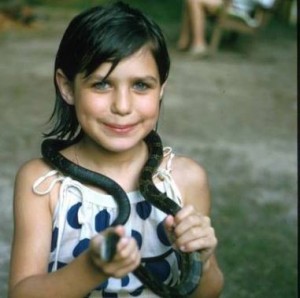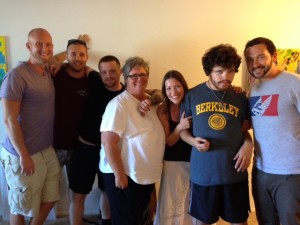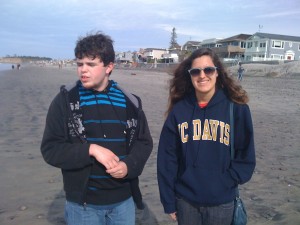
Here is an article I wrote five years ago – Jeremy was 20 years old. (It first appeared in Spectrum Magazine). I’m reprinting it here now because it is still as relevant today as it was back then. Enjoy!
Jeremy is quite a catch – he’s buff from working out at the gym, has an endearing personality, and he starred in an award-winning episode of the MTV ‘True Life’ series. Never mind that he is autistic, needs help with everyday living skills, and probably always will. (In my opinion, he should be looking for a traditional wife who will take care of him, instead of a girlfriend, but I digress.)
One night recently I woke up at 3:00 am to find that all the houselights had been turned on. Usually a sound sleeper, Jeremy had been making the rounds. I heard him downstairs and decided to investigate. He was looking through my husband’s collection of architecture books. He found the one he was looking for, Las Vegas: The Fabulous 50s, and flipped it open to the section on strip clubs and showgirls. “Why are you up, Jeremy, what’s going on?” I asked. “I’m thinking about girls,” he replied.
Oh, how I miss the prepubescent years when Jeremy was examining the guitars in the music magazines and not the beautiful models holding them. Although Jeremy has been showing an interest in females for some time, he is now communicating that guitar magazines just don’t do it for him anymore. I long for the days when his choice of reading and viewing materials ran along the gamut of Dr. Seuss’s ABC and Sesame Street when he wasn’t occupied with his school work.
The show that finally got his attention away from Big Bird is Entourage, a HBO series which is a show about four good friends from Queens, N.Y., now living in Los Angeles who try to get laid and avoid relationships in-between acting gigs. There is a lot of eye candy for the guys on here (and the male actors are not so bad-looking either). Dusty, one of Jeremy’s tutors, offered us the DVD of the first season as a gift. Jeremy got hooked. When asked what he liked about it, Jeremy spelled out by pointing to letters on his letterboard, “I like that they are good friends.” So I bought him Friends, which I thought was a little tamer but still dealt with friendships, but after watching two episodes, Jeremy didn’t want to see anymore. Frankly, there isn’t enough female nudity to keep his interest. I guess it wasn’t the male bonding between the main characters on Entourage that he was focusing on.
My main concerns for Jeremy up until now have been: where will he live, what can he do to earn money, what will happen when my husband and I are no longer alive? Not a week goes by when I don’t research the possibilities and create new possible scenarios in my mind. He is now 20 years old, the same age as the young adults I worked with in a state institution for the developmentally disabled years before Jeremy was born (I guess you can catch autism by osmosis). It is one thing to help people with autism and their families with the emotional detachment of a professional; it is quite another to be caring for and planning for your own child. At the end of the day, it is the parents who are responsible, and it is difficult emotionally as well as practically to try and create a future for your loved one. For most parents of autistic kids, just providing the basic necessities of food, shelter and work for them is a constant worry. But loving caresses, physical intimacy, love, and a relationship with someone who is with you because they choose to be (not because they are related to you) are also basic necessities. I am not immune to the sadness embedded in the emails from parents of young adults writing to me for advice, asking for answers, asking me what they should do. How are they going to cope? I feel their pain. My heart aches as it mirrors my own distress. We have barely enough energy to make it through an autism-filled day, let alone plan for the tangible—and less tangible—future needs of our children.
My son learned to communicate by spelling out on a letter board and has been doing it now for about four years. The way he describes what autism is like for him, it sounds like a less severe form of “locked-in syndrome,” similar to what Jean Dominique Bauby, the editor-in-chief of Elle suffered. Bauby had a stroke and lapsed into a coma and when he woke up he could move only his left eye. He wrote his memoir, The Diving Bell and the Butterfly, blinking out a code representing the letters of the alphabet presented to him on a letterboard.
Jeremy is clear about what he feels and thinks. “Being severely autistic means being stuck in a body that doesn’t work well with no way to communicate. People ask: Do I feel emotions? Yes I do, I just can’t show them. Like when my mom helps me I am really grateful, but I can’t get my face to move. You know autism is very different from being retarded and the difference is that nothing seems different to me. I am the same as you inside. I can’t control my body but I am smart.”
Before my son could communicate his feelings, I had no idea how he felt about people and relationships. To look at his body language, which he can’t really control, you would think he does not want to be around people. Yet, he wants to connect so badly with people his own age and he struggles to find ways to communicate this. His quest to connect with friends was effectively documented on MTV: Jeremy masters assistive technology in order to have a voice, yet has difficulty staying in a room full of noisy people at his own party.
On his 19th birthday, Jeremy let me know for the first time that he was unhappy with his birthday presents. When I asked him why, he spelled, “I want a cell phone.” “What do you want with a cell phone? You are nonverbal,” I exclaimed. “I want to text my friends,” he spelled. He sees how adept his younger sister, Rebecca, is at connecting with her friends via text, and he was hoping to do the same. This cell phone business has been difficult. Those little keyboards are not easy considering the visual processing and motor problems my son has. And the only real friends he has (sadly) are his tutors. But I know he is lonely and wants to connect. So he got a cell phone.
Since Jeremy keeps bringing up girls, I suggested he join Facebook and work on his communication skills, as this is important for any kind of relationship. “Do you think I will really find a girlfriend on Facebook?” he asked. “It’s not that simple, but you will meet people and you can connect with others right from home and practice communicating,” I told him. Now, he goes on Facebook about every other day with one of his tutors. He likes to see if he has any friend requests and to comment on what he is doing. What are you doing right now? Jeremy is thinking the girls at the gym are hot.
Mark, one of his tutors, suggested that Jeremy start working out. He took Jeremy to check out different gyms. Once they had narrowed down their search, Jeremy and I went to discuss membership terms. When it came time to ask questions, mine were the usual, “What is the initial membership fee? What will the monthly payments come to?” I asked. Jeremy’s questions at the first place were a bit different. “Are the girls nice here?” he spelled out. “Are they pretty?”
As we arrived at the second place, LA Fitness, the doors flew open and more than a dozen gorgeous, shapely young women came running out. Jeremy was all smiles. We walked in and the receptionist said, “You’ve just missed the Charger Girls!” Jeremy was even happier. The Charger Girls are the cheerleaders for the San Diego Chargers football team. A Charger Girls poster is the only athletic memorabilia hanging in Jeremy’s room. “I like this place! This is where I want to come workout,” he said. Jeremy got straight to the point with the salesman. “Do the Charger Girls really work out here? Are they good at sports? What is their schedule?”
Jeremy joined LA Fitness, and goes there regularly with either Mark or Troy, another tutor. This past Christmas, Jeremy spelled out, “I want to buy a calendar with pictures of girls for Troy.” “Uhhh…okay, ask Janine,” I replied. Jeremy is, after all, over 18. Sure enough, Jeremy went to the mall with Janine (another tutor) and came back with a calendar aptly titled “Hot Buns.” I’ll leave the rest to your imagination. I’m sure he was inspired by the Charger Girls.
When Troy came over the following Wednesday as usual to take Jeremy to the gym, Jeremy gave him the calendar. Now, Troy is an ex-Navy guy, single dad of an 8-year-old girl, and works in a middle school classroom for students with aggressive behaviors. He is not your shy, withdrawn type. However, he looked perplexed when Jeremy handed him the calendar. “Jeremy, thank you, and I’m honored you thought of me, but why are you giving me this calendar?” Jeremy rocked excitedly back and forth and spelled out, “Because you are the best tutor to help my mom understand she needs to find me a girlfriend.” “Jeremy, I know you need a girlfriend, the question is how to find one,” I said. “Troy is the best tutor to help,” insisted Jeremy.
I asked Jeremy what he wants in a girlfriend. “When I think about having a girlfriend I am thinking about sex,” he explained. I asked, “Is sex all you think about?” “That really is not the main thing. I want a relationship. I want to have someone to talk to and laugh with,” he replied.
We have discussed a lot about what it means to have friendships and relationships and the meaning of love and how that is different from just having sex. He is beginning to understand the complexity and difficulty of it. Even without autism, having a loving intimate relationship with another person is not a given. “I think finding love is not easy for anyone. What I mean is that most people greatly search for love but do not find true love. I know this because I frankly see that my aunt is not married and she is a great person.”
I ask him, “What does love mean for you?” “Love for me means that someone likes my way of thinking about life and the same philosophy about living. Love is not a prisoner but it makes you realize that you care about this person more than anyone else.”
I could not have said it better myself.
While Jeremy has his eye on Entourage for inspiration, I have my sights set on another HBO show, Big Love. Having three wives, a three-house suburban home, an extended family and strong community ties – it sounds like a better model for what Jeremy’s future should look like. With three wives, Jeremy would have the love and intimacy he craves, and the women would have plenty of respite. This arrangement would also solve the housing problem and our worries about what will happen when his father and I are no longer alive. For now, I keep searching for ways for him to connect and relate with people, and to keep alive the flame of hope he carries in his heart that one day, he will find true love.










